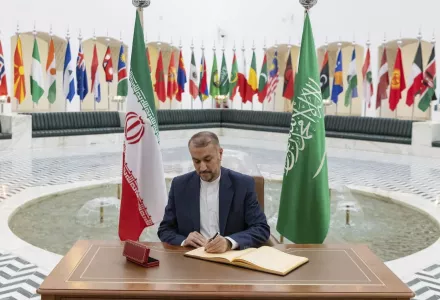
Executive Summary
This study explores the evolving geopolitical dynamics between Saudi Arabia and Iran following the Gaza war and the subsequent escalation between Israel and Iran. The paper investigates the motivations behind each country’s current foreign policies and its relations with foreign actors such as the United States, Russia, and China. It concludes with recommendations for a durable de-escalation of their relationship in a highly complex security environment.
Before the Hamas attack on Israel on October 7, 2023, the ever-evolving geopolitical landscape of the Middle East was apparently finding some respite after a decade of turbulence. However, the war between Israel and Hamas endangered the de-escalation process, altering the landscape of Middle Eastern geopolitics. The Iranian response to Israel’s military incursion into Gaza has spread the conflict to Syria, Iraq, the Red Sea, Yemen, and Lebanon, opening the door to a regional war.
As noted in the report, the Gaza war has not hindered the de-escalation process between Saudi Arabia and Iran, although relations have focused on security issues, with no progress in exploring economic and cultural opportunities. Both countries remain suspicious of each other. Iran’s attack on Israeli territory last April has introduced new dynamics in the region. In light of the military capabilities of Iran and its allies, Saudi Arabia sees a formal defense agreement with the United States as a critical goal for its foreign policy.
The Biden administration’s integrated vision of a bilateral security understanding between the United States and Saudi Arabia, in exchange for the normalization of relations between Israel and Saudi Arabia, has opened the door to a unique opportunity to firmly anchor Saudi Arabia within the American sphere of influence. If the defense agreement is finally signed, it will probably affect the process of de-escalation between Saudi Arabia and Iran, as their dynamics will run parallel to the relations between the United States and Iran. If the defense treaty is not signed, Saudi Arabia may well redouble its efforts to diversify its defense relations and continue to focus on strengthening its different strategic alliances.
This study will underline that the pattern of hostility between Saudi Arabia and Iran is no longer the main geopolitical fracture in the region and is now somewhat connected to the dynamics of the Iran-Israel conflict. It will offer some advice on how to manage both countries’ expectations and will conclude with the idea that unless there is a fundamental shift in the strategic thinking in Iran, it will not be possible to fully normalize its relations with its neighbors.
Escobar Stemmann, Juan José and Gonzalo Arana. “Saudi Arabia and Iran in the Shadows of a Regional War.” Belfer Center for Science and International Affairs, September 2024





